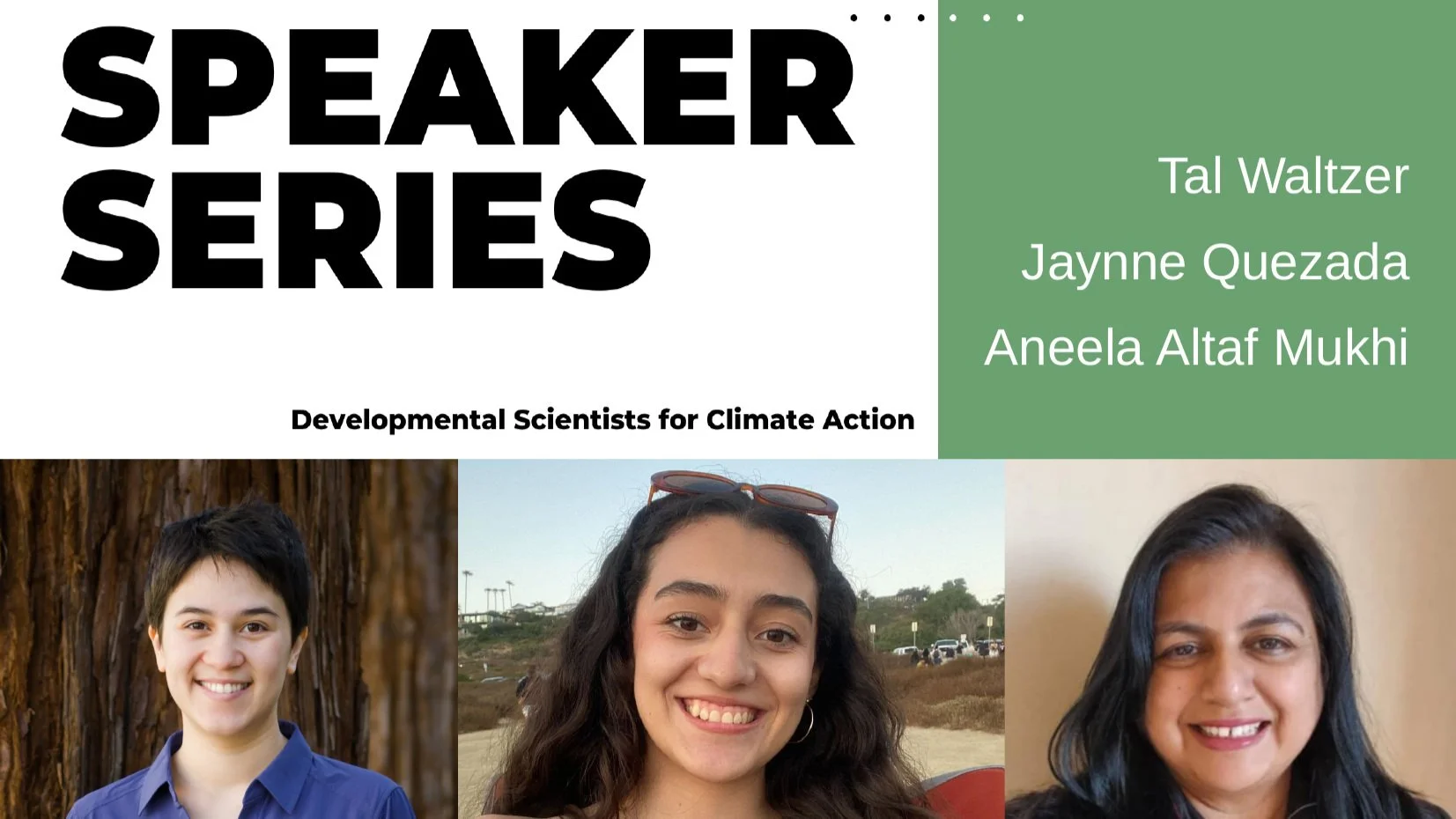Speaker Series 4
Recording
The fourth DevSCA Speaker Series presentation was live-streamed in October 2024. View the live stream recording via the video embedded above.
Abstracts
“What is climate change and what can I do about it?” A survey and educational intervention with 10- to 13-year-olds
This talk explores how youth understand and engage in climate change. Many schools start teaching children about climate change by fourth grade, but we currently know little about how much youth understand by this age and how those beliefs relate to their own actions. In the present research, we surveyed a diverse sample of 10- to 13-year olds from local elementary and middle schools (N = 460), where youth were asked to report their understanding of climate change, their feelings of individual and collective efficacy, their attitudes toward climate action, and their own engagement in actions in the past month. Overall, we found that children knew very little about climate change and many of them associated climate change with individual consumption and waste (e.g.,“Climate change is when people don't put their trash in the can”). On average, children reported somewhat positive efficacy and attitudes toward climate action, but they engaged in very little action themselves. One encouraging finding was that students who felt efficacious about action were more likely to engage in action themselves. To follow up, we implemented an intervention with a subset of 130 of the same children, who learned about climate science in their class across several weeks and later retook the same survey. We found that students reported no higher efficacy or attitudes toward climate action in the post-survey after the intervention. At the end of the talk, we will discuss the implications of our findings for the psychology of climate action, education, and efforts to address the climate crisis.
Climate Resilience Strategies: Empowering Children, Engaging Institutions, and Supporting Families – Integrated Modules for Children, Institutional Stakeholders, and Parents & Caregivers
This presentation discusses climate change resilience education modules tested in diverse settings across two countries, targeting children, parents, and institutional stakeholders. Integrated into disaster preparedness and school safety curricula and delivered through an NGO and a community organization, these modules address the urgent need for climate education. For children, the focus is on basic climate science, specific challenges, and emotional well-being through interactive activities. For institutional stakeholders, the modules guide climate resilience integration into policies and practices, emphasizing informed decision-making and adaptation strategies. Parents and caregivers receive tools to support their children’s eco-consciousness and encourage sustainable practices at home. Results from testing show that participants, including children under six, institutional leaders, and parents, were inspired to take climate action and gained a better understanding of climate change. The positive reception underscores the modules' effectiveness in raising awareness and driving behavioural change. This education package has potential for scaling up, including schools, community centres, public libraries, and more. The presentation will explore the development, testing, and future potential of these modules in contributing to global climate resilience efforts and adapting to various audiences and settings.
Speakers
Tal Waltzer
Dr. Tal Waltzer is a postdoctoral scholar in the psychology department at UC San Diego. Tal received a bachelor’s degree in psychology and cognitive science from Rutgers University in 2015 and a PhD in developmental psychology from UC Santa Cruz in 2022 (supervisor: Dr. Audun Dahl). Tal is currently an NSF fellow working with Dr. Gail Heyman, Dr. Kang Lee, and other collaborators to study how youth and adults make decisions about ethical issues in their everyday lives (SPRF-FR# 2104610).
Jaynne Quezada
Jaynne Quezada is a second-year undergraduate student at UC San Diego pursuing a B.S. in psychology with a specialization in developmental psychology. Jaynne is a research assistant at the Social Cognitive Development Lab at UC San Diego, which has allowed her to expand her interest in research and engage in data analysis. Jaynne currently resides in San Diego where she was born and raised, and where much of the research explored was collected.
Aneela Altaf Mukhi
Aneela Altaf Mukhi is an educationist, ECD expert, international consultant, and climate activist with over 20 years of experience, holding a BA, MA, MEd, and currently pursuing a PhD in Early Childhood Development. Recently, her focus has been on integrating climate change education into curricula for multiple organisations. Her career spans seven countries, where she has worked with organizations like the Aga Khan Development Network (AKDN) and Uganda’s Ministry of Education, supported by UNICEF, UNOPS, and other donor agencies. Specializing in program and policy development, curriculum design, and child protection, she is dedicated to enhancing educational outcomes, child rights advocacy, and gender empowerment. She also contributes to adult education and community resource development. Currently, she serves as a lead consultant for the Aga Khan Foundation in Pakistan.



